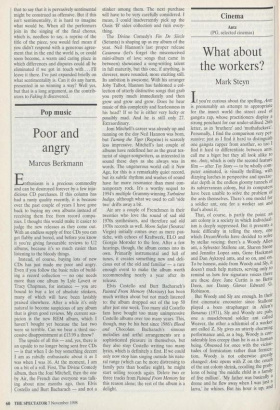Pop music
Poor and angry
Marcus Berkmann Enthusiasm is a precious commodity and can be destroyed forever by a few inju- dicious CD purchases. If this column has had a ranty quality recently, it is because over the past couple of years I have gone back to buying my own albums instead of receiving them free from record compa- nies. I thought this would make it easier to judge the new releases as they come out. With an endless supply of free CDs you can get flabby and bored, and before you know it you're giving favourable reviews to U2 albums, because it's so much easier than listening to the bloody things.
Instead, of course, buying lots of new CDs has just made me poor and angry. Even if you follow the basic rules of build- ing a record collection — no one needs more than one album by Lyle Lovett or Tracy Chapman, for instance — you are bound to buy a lot of absolute stinkers, many of which will have been lavishly praised elsewhere. After a while it's only natural to become suspicious of any album that is given good reviews. My current sus- picion is the new REM album, which I haven't bought yet because the last two were so terrible. Can we bear a third suc- cessive disappointment at £13.99 a throw?
The upside of all this — and, yes, there is an upside to no longer being sent free CDs — is that when I do buy something decent I am as rabidly enthusiastic about it as I was when I was 16. At the moment, I am on a bit of a roll. First, The Divine Comedy album, then the Joni Mitchell, then the one by Air, the French duo everyone was talk- ing about nine months ago, then Elvis Costello and Burt Bacharach — and not a stinker among them. The next purchase will have to be very carefully considered. I mean, I could inadvertently pick up the Oasis 'B' sides collection and ruin every- thing.
The Divine Comedy's Fin De Siècle (Setanta) is shaping up as my album of the year. Neil Hannon's last proper release Casanova (let's forget the misconceived mini-album of love songs that came in between) showcased a song-writing talent in full maturity, but this one, if anything, is cleverer, more rounded, more exciting still. Its ambition is awesome. With his arranger Joby Talbot, Hannon has fashioned a col- lection of utterly distinctive songs that grab you pretty much immediately and then grow and grow and grow. Does he hear music of this complexity and fearlessness in his head? If so he is either very lucky or possibly mad. And he is still only 27. Extraordinary.
Joni Mitchell's career was already up and running on the day Neil Hannon was born, but Taming the Tiger (Reprise) is scarcely less impressive. Mitchell's last couple of albums have redefined her as the great tex- turist of singer-songwriters, as interested in sound these days as she always was in words. The ungenerous world call it New Age, for this is a remarkably quiet record, but its subtle rhythms and washes of sound have far more resonance than most con- temporary rock. It's a worthy sequel to 1994's multiple Grammy-winning Turbulent Indigo, although what we used to call 'side two' drifts away a bit.
Air are a couple of Frenchmen in their twenties who love the sound of sad old 1970s synthesisers, and therefore sad old 1970s records as well. Moon Safari (Source/ Virgin) initially comes over as mere pas- tiche, with echoes of ICraftwerk, ELO and Giorgio Moroder to the fore. After a few hearings, though, the album comes into its own. Primarily instrumental and full of tunes, it creates something new and deli- cious out of the old and familiar — a rare enough event to make the album worth recommending nearly a year after its release.
Elvis Costello and Burt Bacharach's Painted From Memory (Mercury) has been much written about but not much listened to: the album dropped out of the top 50 after just one week. Too many old Costello fans have bought too many unimpressive Costello albums over too many years. This, though, may be his best since 1986's Blood and Chocolate. Bacharach's sinuous melodies and artful arrangements are a sophisticated pleasure in themselves, but they also stop Costello writing too many lyrics, which is definitely a first. If we could only now stop him singing outside his natu- ral range (which can be more distressing to family pets than bonfire night), he might start selling records again. Delete two or three tracks from Painted From Memory for this reason alone; the rest of the album is a delight.


















































































 Previous page
Previous page